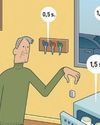How did this dairy product— long considered Mother Nature’s perfect food—become so controversial?

WHEN PAUL ROBERT, 62, of Almere, a city near Amsterdam, was in elementary school, he wore a special badge on his coat to show that he was a member of the Milk Brigade. This meant that he drank three glasses of milk each day.
This was just one advertising campaign created by the Dairy Bureau, an organisation of dairy farmers in the Netherlands, that Robert remembers from childhood. In 1957, schools promoted the Milk Brigade, and the government-funded “school milk.”
In 1965, the Dairy Bureau introduced milk-guzzling cartoon character Joris Driepinter (George Three-Pint). “Drinking milk made him a superhero who could lift elephants,” Robert says. “Anyone in the Netherlands who is over 40 grew up convinced that milk is healthy and necessary.”
A badge and the possibility of superhuman strength didn’t convince Robert to become a lifelong milk-drinker. “I stopped drinking milk ages ago, just because I don’t like it anymore,” he says. “No idea why. It was not a conscious process.”
Decades ago, cow’s milk was touted as one of the healthiest beverages available, superior to coffee, juice, and fizzy drinks. But over time, milk has fallen from grace.
In the 1950s, Swedes drank, on average, nearly two and a half glasses of milk a day. “We’re now down to less than one glass,” says Dr. Karl Michaëlsson, a professor of surgical sciences at Uppsala University in Sweden.
Sales have dropped across Europe—by 20 per cent over the past decade in Sweden, and by about 30 per cent over the past 15 years in the United Kingdom. Finland has the world’s second highest milk consumption (behind Ireland), at 122 litres per capita per year, but that’s down 19 per cent, compared to 20 years ago.
この記事は Reader's Digest UK の September 2018 版に掲載されています。
7 日間の Magzter GOLD 無料トライアルを開始して、何千もの厳選されたプレミアム ストーリー、9,000 以上の雑誌や新聞にアクセスしてください。
すでに購読者です ? サインイン
この記事は Reader's Digest UK の September 2018 版に掲載されています。
7 日間の Magzter GOLD 無料トライアルを開始して、何千もの厳選されたプレミアム ストーリー、9,000 以上の雑誌や新聞にアクセスしてください。
すでに購読者です? サインイン

EVERY SECOND COUNTS: TIPS TO WIN THE RACE AGAINST TIME
Do you want to save 1.5 seconds every day of your life? According to the dishwasher expert at the consumer organisation Choice, there’s no need to insert the dishwashing tablet into the compartment inside the door.

May Fiction
An escaped slave's perspective renews Huckleberry Finn and the seconds tick down to nuclear Armageddon in Miriam Sallon’s top literary picks this month

Wine Not
In a time of warning studies about alcohol consumption, Paola Westbeek looks at non-alcoholic wines, how they taste and if they pair with food

Train Booking Hacks
With the cost of train travel seemingly always rising, Andy Webb gives some tips to save on ticket prices

JOURNEY TO SALTEN, NORWAY, UNDER THE MIDNIGHT SUN
Here, far from the crowds, in opal clarity, from May to September, the sun knows no rest. As soon as it’s about to set, it rises again

My Britain: Cheltenham
A YEAR IN CHELTENHAM sees a jazz festival, a science festival, a classical music festival and a literature festival. Few towns with 120,000 residents can boast such a huge cultural output!

GET A GREEN(ER) THUMB
Whether you love digging in the dirt, planting seeds and reaping the bounty that bursts forth, or find the whole idea of gardening intimidating, this spring offers the promise of a fresh start.

Under The GRANDFLUENCE Suzi Grant
After working in TV and radio as an author and nutritionist, Suzi Grant started a blog alternativeageing.net) and an Instagram account alternativeageing). She talks to Ian Chaddock about positive ageing”

Sam Quek: If I Ruled The World
Sam Quek MBE is an Olympic gold medalwinning hockey player, team captain on A Question of Sport and host of podcast series Amazing Starts Here

Stand Tall, Ladies
Shorter men may be having their moment, but where are the tall women?